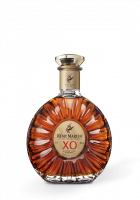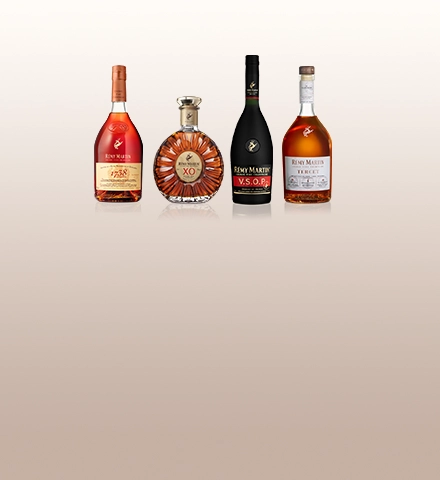Introduction
Both cognac and whiskey are spirits – but what’s the difference? All spirits are a type of alcohol made by distilling fermented fruits, grains, or other sources of sugar, but the two of the most popular spirits have completely different origins, processes, and tasting experiences.
Cognac vs. Whiskey: Key Differences


They may look similar in a glass, but cognac and whiskey offer entirely distinct experiences.
To start, the first difference between these popular spirits is their primary ingredients: cognac is made out of grapes, making it a type of fruit brandy, while whiskey is made from a variety of grains, mainly barley, rye, corn, and wheat.
The next key difference is where they are produced: cognac is made from grapes exclusively grown in the small Cognac region of France, while whiskey is made all around the world such as in Scotland, the United States, Canada and Japan.
All these differences produce two very different spirits with distinct flavor profiles.
Understanding Cognac with Rémy Martin
A product of aromatically complex grapes, cognac captures and amplifies the nuances of its origins and terroir. For the past 300 years, the House of Rémy Martin has pursued a quest to capture the very quintessence of cognac to reveal the talents of nature and humankind. Cognac must be made according to strict requirements established under French law called an “Appellation d’Origine Contrôlée” (AOC or controlled designation of origin).


Cognac’s Exceptional Terroir
The unique aromatic richness of our House style is the result of several factors – first of which is we only make cognac classified as “Fine Champagne”. This official AOC designates applies only to grapes grown in the region’s two most prestigious growth areas of Grande Champagne and Petite Champagne.
The chalky soils of these crus support ideal vine vigor and grape ripeness, material for wines of finesse, perfect for distilling.


Cognac’s Distilling Methods
In addition to the selection of these two crus, Rémy Martin employs traditional distillation methods on the lees in small copper pot stills, uses large grained oak barrels for the aging process, and benefits from the outstanding craftsmanship of the House’s Cellar Masters.
A Cognac must be double distilled in copper pot stills then aged in oak barrels for a certain amount of time depending on its classification, from a minimum of 2 to 10 years or even more in the case of an Hors d’âge Cognac. Whiskey can be made in a variety of ways, with different styles following specific regional rules when it comes to distillation methods and aging minimums.
Cognac’s Aging Process
Cognac is always aged at least two years in french oak casks and beyond our AOC, another important factor in understanding cognac is an official grading system that classifies cognac by age, including: VS (Very Special), VSOP (Very Superior Old Pale) and XO (Extra Old).
Rémy Martin only produces VSOP & XO aging grades, but also special cognacs that embody the signature creativity of our Cellar Masters such as the 1738 Accord Royal.
Fruit-forward, rich, smooth with a long finish make up Rémy Martin Cognac’s signature style.
Understanding Whiskey
Unlike cognac, which necessarily comes from France and is strictly-defined and regulated, whiskey can come from many places, be made from many things, using many different methods, and result in very distinct characteristics and flavor profiles.
A selection of the most popular whiskeys includes:


Scotch Whisky
Scotch is the most common type of whiskey produced worldwide. It is strictly regulated like Cognac, being distilled exclusively in Scotland from malted barley.
The two most common styles of Scotch are Single Malt and Blended, each with their own production requirements.


Single Malt Scotch is made by a single distillery entirely out of malted barley, distilled in copper stills, then aged in oak barrels (also known as casks) for a minimum of 3 years. This produces a rich, velvety, and complex flavor profile, often reflecting which region of Scotland it was produced. For example, the Island of Islay produces peated Scotch, using peat smoke to dry the barley and impart a distinctive, smoky flavor.
Blended Scotch is the most common type of Scotch, produced by blending Single Malt Scotch with other grain whiskeys from corn, wheat, or other grains. This greater flexibility results in flavor profiles that vary by producer and can be somewhat milder or sweeter.

Whiskey From Other Parts of the World
Whiskey from Ireland also follows regional regulations, such as requiring it to be aged a minimum of 3 years in barrels. Irish Whiskey is typically smoother and lighter in taste, often triple-distilled for added purity.
Bourbon is a type of whiskey traditionally from Kentucky in the United States. It is made from a mash that must contain a majority of corn and aged in brand new, charred oak barrels. This gives Bourbon a sweet and robust flavor profile.
Rye whiskey is another type of whiskey from the United States that must be made from a mash containing a majority of rye grains. This gives Rye a spicier, fruitier taste profile.
Japanese whisky is particularly smooth and complex, combining Scottish methods with Japanese precision.
For all this diversity, it’s difficult to generalize whiskey’s characteristics and flavor profiles. Whether enjoyed neat, on the rocks, or in a cocktail, whiskey is a beloved, popular spirit that has captivated connoisseurs and casual drinkers alike for centuries.

Rémy Martin Cognac Alternatives to Whiskey
For whiskey connoisseurs curious about cognac, Rémy Martin has a collection of exciting alternatives to discover.
A perfect starting point for those new to cognac is Rémy Martin VSOP, a versatile, well-balanced, and multi-layered cognac that embodies the perfect harmony of powerful and elegant aromas. For a more distinctive flavor profile with spice notes that can easily appeal to rye lovers, Rémy Martin 1738 Accord Royal is particularly smooth and round with a creamy aftertaste. .
For something most likely to appeal to malt whiskey connoisseurs, Rémy Martin XO is a full-bodied, complex, and opulent, cognac made from a unique blend of hundreds of eaux-de-vie aged at least 10 years.
FAQs: Cognac vs. Whiskey
Cognac is renowned for its defining smoothness, while whiskeys vary greatly depending on their style, maker, and production.
Absolutely – cognac can be swapped in for whiskey in common cocktail recipes. For example, Rémy Martin XO can bring a new dimension to a classic Old Fashioned or Mint Julep in place of rye or bourbon.
By definition, cognac is geographically limited, relies on a delicate raw material, and involves a long aging process. These parameters contribute to cognac’s average price being higher than grain-based spirits.
Generally, cognac is often considered to taste somewhat less strong than whiskey. In terms of alcoholic content, cognac has 40% ABV, while whiskey can range between 40-50% ABV.
Like Champagne, most cognacs and whiskeys do not bear a vintage year of their production. Sometimes, producers will choose to give standout bottles a vintage under exceptional circumstances. This is different from Armagnac for example, where almost all bottles are a vintage.
Absolutely – the tulip glass is the recommended shape to best enjoy tasting most spirits served neat. This specific form allows for a balanced nose, palate, and notes.
No, cognac is never peated. Using peated smoke is a very specific practice that is only performed by a small number of Scotch distilleries.
“Eau de vie” is the French term for any alcoholic spirit produced by distillation, and “assemblage” means a blend of multiple eaux de vie. Cognac is an assemblage, meaning Cellar Masters select and mix different eaux de vie in order to reproduce the same exact taste profile year after year no matter the variations in the harvest. Most of the time, whiskey is also a blend of several eaux de vie. That said, producers sometimes create exceptional bottles from a single cask of a particularly outstanding eau de vie.
Conclusion
While both cognac and whiskey are aged spirits, they offer entirely distinct experiences stemming from their unique origins, production processes, and flavor profiles. For whiskey lovers intrigued by the allure of cognac, Rémy Martin offers an enticing array of cognac expressions that serve as exciting alternatives to explore whether it’s neat, on the rocks, or in your favorite whiskey cocktail.





















